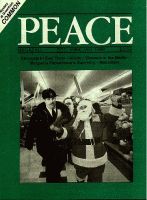
Peace Magazine Dec 1989-Jan 1990, page 21. Some rights reserved.
Search for other articles by Hans Sinn here
Dietrich Fischer, Wilhelm Nolte, and Jan Oberg, Winning Peace - Strategies and Ethics for a Nuclear Free World Crane Russac, N.Y. and London, 1989. 272 pp. references, index. Hardcover $35, paperback $19.95
Swiss/American social scientist, Dietrich Fischer, a Lieutenant Colonel from the German Bundeswehr, Wilhelm Nolte, and a Swedish peace researcher, Jan Oberg, collaborated in the production of Winning Peace. This book successfully treats defence and peace as an integrated whole.
Because of the diversity of the field, the authors divided, and then reintegrated, their work according to their respective areas of expertise: computer science and economics (Fischer), military science and practice (Nolte), and sociology and peace research (Oberg). The book falls into five parts: An Active Peace Policy; Protecting People; Changing Our Ways of Thinking; Security and Society; If You Want Peace, Prepare for Peace.
Starting from the assumption that "war is always an inefficient solution to conflict," the authors combined a variety of alternative defence and conflict resolution strategies: area defence through military forces, urban resistance through civilian force (social defence), and population protection through protection force (civil defence). Their concept is one of defensive defence which, like common defence, takes the adversary's security needs into account. It is designed to give the opponent the chance to reconsider ten times before engaging in all-out war.
The book is directed to a reader who relies on nuclear deterrence for security and who may be looking for a way out. While considering the powerful vested interest in the military and economic status quo, the authors do not pursue a class analysis. A Marxist might therefore judge Winning Peace as somewhat naive since it fails to consider the role of economic exploitation and social disparity as causes for war and violence. Instead the authors concern themselves with our fundamental assumptions - the social cosmology, the "program" which is shaping the ways in which we think. The authors are guided by Einstein's demand (whom they cite repeatedly) that if we want to avoid nuclear catastrophe we must change our mode of thinking. They believe "that the most important military problems - so central in mainstream debates about defence, security, and peace - are not essentially military, but products of a purely civilian program on which we operate."
Winning Peace systematically points out some fundamental collective assumptions and potential alternatives. The book has numerous graphs and charts by which the authors illustrate their points without seeming to draw a blueprint for peace, security or of the human mind. The authors succeed by their own obvious good nature, and by the tentative and exploratory character of their efforts and conclusions. Their invitations to the interested reader to participate in their work through the Transnational Foundation for Peace and Future Research, Sweden, sounds serious. The reader can do more than read the book.
Most important, Winning Peace is proof that successful collaboration is possible between civilians and military, in the interest of peace and security. In addition to their own example, the three authors inform us about the 31 professional soldiers who, since World War II, have promoted alternative concepts of defence. Of them, 22 hold the rank of general.
Hans Sinn is with Peace Brigades Canada and lives in Perth, Ontario.

Peace Magazine Dec 1989-Jan 1990, page 21. Some rights reserved.
Search for other articles by Hans Sinn here